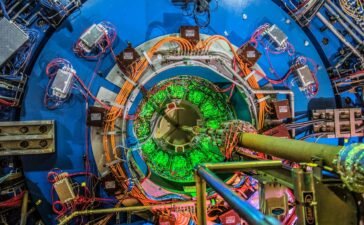Could we set Uranus on fire to steal its hidden diamonds?

Dead Planets Society is a podcast that takes outlandish ideas about how to tinker with the cosmos – from snapping the moon in half to causing a gravitational wave apocalypse – and subjects them to the laws of physics to see how they fare. Listen on Apple, Spotify or on our podcast page.
Uranus and Neptune are remarkably alike, so we don’t need both of them. That’s the reasoning behind this episode of Dead Planets Society, in which our hosts Chelsea Whyte and Leah Crane have decided to light Uranus on fire.
Of course, there is a scientific rationale for this – for one, burning a material and examining its light through a method called spectroscopy is one of the best ways to determine its chemical composition. For another, the deep interiors of the ice giant planets remain murky and mysterious, so burning away the outer layers could reveal what is beneath.
Before we reach for some matches, this episode’s special guest, planetary scientist Paul Byrne at Washington University in St. Louis, Missouri, says this might be tricky. As he explains, the outer layers of Uranus are lacking in oxygen, which is required for combustion. It might not even help to pump in more oxygen than is contained in the entire solar system.
But the interior of Uranus isn’t just mysterious; it also may be full of iceberg-like chunks of diamond. That quickly shifts our hosts’ focus. This is no longer a mission of pyrotechnics – it’s a heist.
We still need to get rid of the planet’s outer layers, and the most efficient way to do that is probably by slamming another world into it. From Earth, this would look like a flash of light, a cloud of glowing vapour and potentially a bright tail forming behind Uranus. The impact would have to be carefully planned to avoid smashing the planet and its diamonds to bits.
With the right collision, though, we could accomplish both the new goal of getting at Uranus’s diamonds and the original goal of exposing its deeper layers so they can be studied. We could also ruin the entire solar system, but when has that been a concern in the Dead Planets Society?
Topics:
You Might Also Like
Physicists are uncovering when nature’s strongest force falters
The STAR detector at the Relativistic Heavy Ion ColliderBROOKHAVEN NATIONAL LABORATORY We are getting closer to understanding when the strong...
There are five types of sleep – here’s what that means for your health
Sleep can be experienced very differently from one person to the nextPeopleImages/Shutterstock Different people may experience one of five types...
Your happiness in life may not be U-shaped – here’s how it could vary
Our happiness levels are not constant throughout our livesIppei & Janine Photography/Getty Images The commonly held belief that happiness follows...
Jane Goodall, dogged advocate for the natural world, has died aged 91
Jane Goodall studying the behaviour of a chimpanzee during her research in TanzaniaPenelope Breese/Liaison Renowned conservationist Jane Goodall has died...









